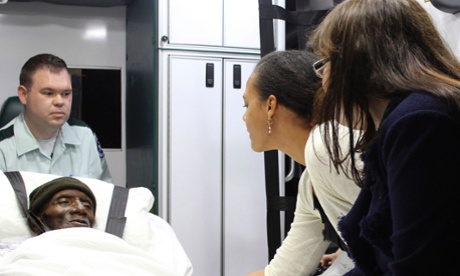Herman Wallace, who is dying of cancer, endured long legal battles after his 1972 murder conviction
Herman Wallace with his legal team after he was released. Photograph: Lauren McGaughy/AP
A 71-year-old Louisiana prisoner who spent 41 years in solitary confinement and is now dying of cancer was released from prison late on Tuesday, his lawyers said.
Late on Tuesday, US district chief judge Brian Jackson in Baton Rouge denied the state's motion seeking to block his earlier order overturning Herman Wallace's 1974 murder conviction in the death of Angola prison guard Brent Miller.
Jackson had also ordered a new trial because women were unconstitutionally excluded from the grand jury that indicted Wallace in the guard's death. He ordered him to be released immediately.
Wallace and two other inmates convicted in the 23-year-old guard's slaying came to be known as the Angola Three.
Wallace, of New Orleans, was serving a 50-year armed robbery sentence when Miller was fatally stabbed in 1972. Wallace and the two others convicted in Miller's death were moved to isolation at the Louisiana state penitentiary in Angola. In 2009, Wallace was moved to "closed-cell restriction" at Hunt correctional in St Gabriel and recently was taken to the prison's hospital unit.
Amnesty International USA last year delivered a petition to Louisiana governor Bobby Jindal's office, containing 65,000 signatures calling called the men's solitary confinement inhuman and degrading.
The group's executive director, Steven Hawkins, welcomed Tuesday's ruling.
"Tragically, this step toward justice has come as Herman is dying from cancer with only days or hours left to live," he said in a statement. "No ruling can erase the cruel, inhuman and degrading prison conditions he endured for more than 41 years."
Wallace's attorneys said the freed prisoner left a correctional centre in St Gabriel by ambulance on Tuesday evening and was expected to go to hospital in New Orleans for treatment of advanced terminal liver cancer.
"Tonight, Herman Wallace has left the walls of Louisiana prisons and will be able to receive the medical care that his advanced liver cancer requires," his legal team said in a statement.
Earlier on Tuesday Jackson had overturned Wallace's 1974 murder conviction in Miller's death.
"The record in this case makes clear that Mr Wallace's grand jury was improperly chosen in violation of the Fourteenth Amendment's guarantee of 'the equal protection of the laws' ... and that the Louisiana courts, when presented with the opportunity to correct this error, failed to do so," Jackson wrote.
"Our Constitution requires this result even where, as here, it means overturning Mr Wallace's conviction nearly 40 years after it was entered."
George Kendall, one of Wallace's attorneys, told the Associated Press in an earlier telephone interview the decision gives his client "some measure of justice after a lifetime of injustice", but his response was tempered by the grim outlook for Wallace's health.
"He's pleased," Kendall said of Wallace's reaction after hearing of Tuesday's ruling, "but he's quite ill."
Wallace has been diagnosed with terminal liver cancer. Kendall said he "ceased receiving treatment a couple of weeks ago".
Kendall said the state had filed notice it would appeal against Jackson's ruling. A telephone message left with East Baton Rouge parish district attorney Hillar Moore's office was not immediately returned.
Kendall said his client has asked that, after his death, they continue to press the lawsuit challenging Wallace's "unconstitutional confinement in solitary confinement for four decades".
"It is Mr Wallace's hope that this litigation will help ensure that others, including his lifelong friend and fellow 'Angola Three' member, Albert Woodfox, do not continue to suffer such cruel and unusual confinement even after Mr Wallace is gone," his legal team said in a written statement.
Woodfox, who remains in custody, and Wallace have continued to deny involvement in Miller's killing and say they were targeted because they helped establish a prison chapter of the Black Panther Party at the Angola prison in 1971, set up demonstrations and organised strikes for better conditions.
The third man, Robert King, was released after 29 years in solitary confinement.


Sem comentários:
Enviar um comentário